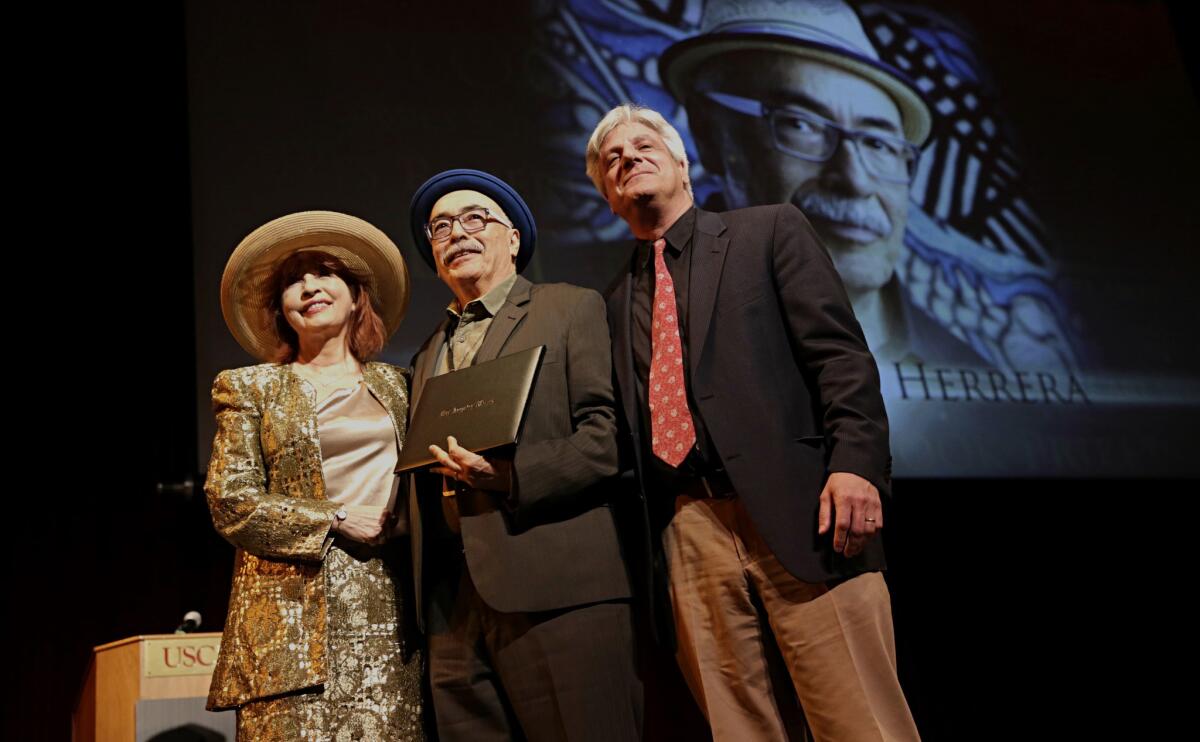Juan Felipe Herrera’s words of wisdom: You. Have. A. Beautiful. Voice.

U.S. Poet Laureate Juan Felipe Herrera, center, accepts the Robert Kirsch Award for lifetime achievement from Patt Morrison, left, and former Times book editor David Ulin.
Juan Felipe Herrera was awarded the L.A. Times Book Prize Robert Kirsch Award for lifetime achievement at the LA Times Book Prizes on Sat., April 9. This is a transcript of his acceptance speech.
Thank you so much. Muchas gracias. I am humbled by this. I want to thank Robert Kirsch’s legacy and Robert Kirsch, his example. The L.A. Times -- a beautiful, amazing, thorough, incredible, intelligent newspaper, and a set of knowledge. All those organizers for the book festival. How beautiful it is, a book festival fiesta where we all come together and we see many colors, and many books, and we laugh and we sit and we reflect and we walk and we move, with each other. And want to also acknowledge my wife, Margarita, who really is the author of all my books -- she gives me so many ideas and takes time to leave me totally alone, which requires a lot of energy because, you know, there are so many things to do.
And as I look at those photographs, I think about my parents, again, and I think of the more than 100 years – my father was born in 1882 – and I think of that long trek from his first steps into Denver, Colo., in the late 1800s as a 14 year-old boy, with only himself. And his journey from Chihuahua, northern Mexico, and how he had to learn words by buying them for a penny in his work, and in the fields, and on the highways, on the trains, and in the wells of water where he also worked, as well. And the stories that my mother gave me, her journey from Mexico City from the poorest barrio, Tepito, and the outer edge of that barrio called El Nino Perdido, The Lost Child. And how she made it to Juarez with her mother, my grandmother, and her sister, my aunt Aurelia. And eventually to El Paso, Texas, the Borderlands. And how she gave me her songs and her poems and her words and her riddles and her sayings, and most of all that beautiful heart that she had, made out of kindness.
And I also reflect on the days here in L.A., when I came when I was 17 to the university with an affirmative-action scholarship. The EOP scholarships had just come out at UCLA and there I was. I was amazed because it was a new world for me. There were so many voices, and we were all singing out and talking out. Civil rights. End the wars that were taking place in the world, in Vietnam. And the wars in our own nation, and the wars inside of us. How there needed to be a voice. And what was that voice made out of? I did not know, but I knew I had to create it, I knew I had to push it, I knew I had to let it fly. And I had to do it anywhere and everywhere. That’s what we were all doing, and you were doing this too.
And most of all my parents. And most of all our immigrant and migrant families’ communities. With so many limitations, not able to speak in our languages in the schools most of the time. And so many barriers that are put up, as you know very well, for our mobility, for our life expansion, for our minds to flourish with all minds, to reach one big mind together.
So that’s what this is for me. It is that big, beautiful sparkling circle of so many journeys, so many sacrifices, so much wisdom offered along the way and so much gathering of that wisdom into this thing called poetry. Into this thing called community and life and giving. And bringing about more voices. Beautiful voices.
I tell everyone what my third-grade teacher Mrs. Lilia Sampson told me: You have a beautiful voice. I didn’t want to believe her. How could she tell me that? But she began with me, with those words, and that phrase. I tell everyone and I tell you. People say, How do you do this? How do I go about things? Well I said, let’s start with this. Let’s start with this. You. Have. A. Beautiful. Voice.
Thank you so much, everyone.
More to Read
Sign up for our Book Club newsletter
Get the latest news, events and more from the Los Angeles Times Book Club, and help us get L.A. reading and talking.
You may occasionally receive promotional content from the Los Angeles Times.








